Zubeen Garg: The Immortal Voice of Assam - A Comprehensive Journey Through Life, Music, and Cultural Legacy
The golden voice that defined modern Assamese music for over three decades fell silent on September 19, 2025, when legendary singer Zubeen Garg passed away at the age of 52 in a tragic scuba diving accident in Singapore. His untimely death has left an irreplaceable void in the cultural landscape of Assam and the broader Indian music industry. From his groundbreaking debut album "Anamika" in 1992 to his iconic Bollywood hit "Ya Ali," Zubeen Garg transcended linguistic and cultural boundaries while remaining deeply rooted in Assamese identity. His remarkable journey encompassed roles as a singer, composer, actor, director, activist, and philanthropist, making him not just a musical icon but a complete cultural ambassador for Northeast India.
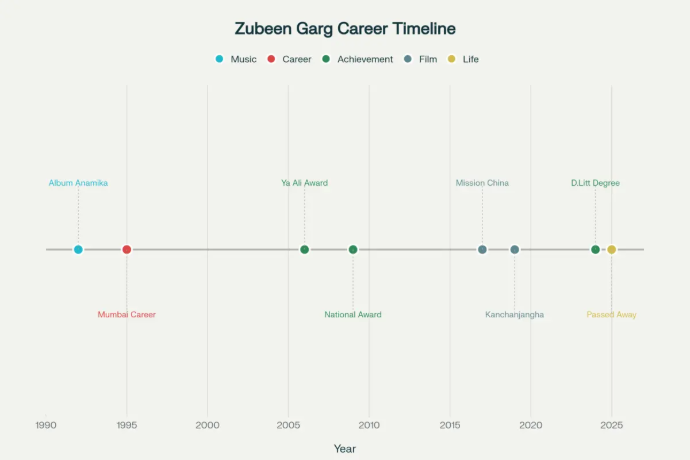
Timeline of Zubeen Garg's Major Career Milestones (1992-2025)
Early Life and Musical Genesis
Family Background and Childhood
Born as Zubeen Borthakur on November 18, 1972, in Tura, Meghalaya, Zubeen came from a culturally rich Assamese Brahmin family with deep artistic roots. His father, Mohini Mohon Borthakur, was a magistrate who also pursued writing under the pen name Kapil Thakur, contributing significantly to Assamese literature. His mother, Ily Borthakur, was a talented singer, dancer, and actress who never turned her artistic abilities into a professional career but instead nurtured these talents in her children.
The choice of his name reflected global aspirations tempered with cultural pride - he was named after the legendary Indian conductor Zubin Mehta, while his surname "Garg" represented his Brahmin gotra, replacing the family surname Borthakur. This decision symbolically represented his later approach to music: embracing global influences while maintaining strong regional identity.
Early Musical Influences and Education
Zubeen's musical journey began remarkably early, as he started singing at the age of three under his mother's guidance. His formal musical education included eleven years of tabla training under Pandit Robin Banerjee, while Guru Ramani Rai introduced him to the rich traditions of Assamese folk music. He was also an accomplished multi-instrumentalist, eventually mastering twelve instruments including anandalahari, dhol, dotara, drums, guitar, harmonica, harmonium, mandolin, keyboard, tabla, and various percussion instruments.
His academic journey took him through Tamulpur Higher Secondary School and later to Karimganj College and B. Borooah College for higher education. However, his passion for music proved stronger than conventional academics, and he dropped out of his Bachelor of Science degree to pursue his musical calling. Remarkably, this decision would later be vindicated when he received an honorary Doctor of Literature (D.Litt.) degree from the University of Science and Technology, Meghalaya, in 2024.
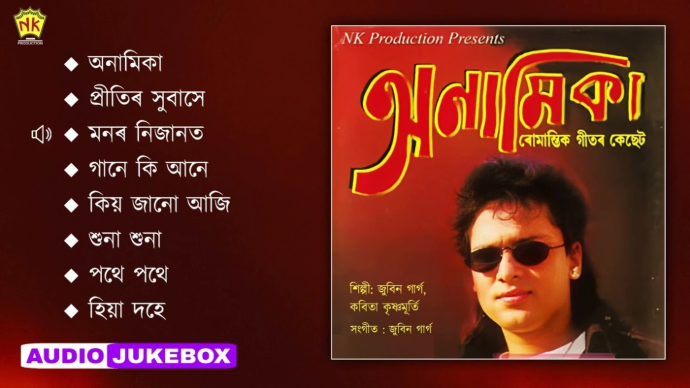
Cover art of the Assamese album 'Anamika' featuring Zubeen Garg with a list of songs and production details youtube
The Revolutionary Debut: Anamika Era (1992-1995)
Breaking New Ground in Assamese Music
Zubeen's professional music career began with a pivotal moment in 1992 when he won a gold medal for his western solo performance at a youth festival. This achievement gave him the confidence to venture into professional music, leading to the release of his debut album "Anamika" in November 1992 at the remarkable age of 19.
"Anamika" was not merely another album release; it was a cultural revolution that redefined the Assamese music landscape. The album successfully fused rock influences from his early band "Boom Boom" with the soulful cadence of Assamese folk music, creating a sound that felt both revolutionary and rooted. This unique blend of modern sounds with traditional Assamese folk music garnered widespread acclaim and instantly connected with the youth of Assam.
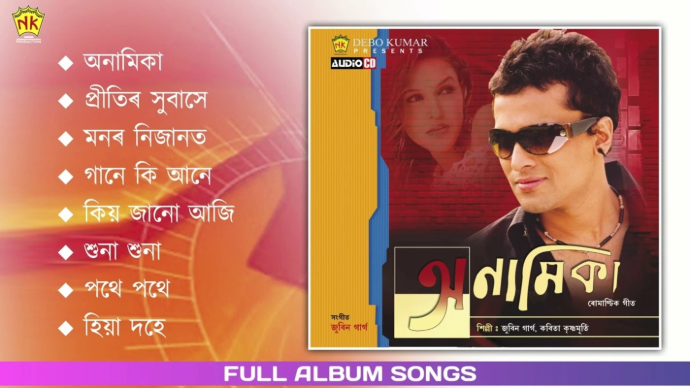
Cover art of Zubeen Garg's Assamese music album Anamika with song list in Assamese youtube
Impact on Assamese Cultural Identity
The success of "Anamika" marked a turning point for Assamese music in the 1990s, a decade when young people were struggling to find their cultural identity in a rapidly globalizing world. Zubeen's music provided them with a voice that was both contemporary and authentically Assamese, helping them reconcile tradition with modernity. His unique lyrics, soulful voice, and modern composition gave new hope and direction to a generation seeking to maintain their cultural roots while embracing global influences.
Following "Anamika," he released several other successful albums including "Maya" (1994), "Asha" (1995), and "Pakhi," each further cementing his position as a leading figure in Assamese music. His first Bihu album "Ujan Piriti" achieved commercial success before he moved to Mumbai in 1995, demonstrating his ability to excel across different genres of Assamese music.
Bollywood Journey and National Recognition (1995-2010)
Mumbai Years and Hindi Music Ventures
In mid-1995, driven by ambition to reach a wider audience, Zubeen moved to Mumbai to establish himself in the Bollywood music industry. His debut Hindi album "Chandni Raat" marked his entry into the Indipop scene, followed by several other albums and remix songs including "Chanda" (1996), "Shradhaanjali" volumes 1-3 (1996-97), "Jalwa" (1998), "Yuhi Kabhi" (1998), "Jadoo" (1999), and "Sparsh" (2000).
His early Bollywood playback singing career included contributions to films like "Gaddaar" (1995), "Dil Se" (1998), "Doli Saja Ke Rakhna" (1998), "Fiza" (2000), and "Kaante" (2002). However, it was his patience and persistence that would eventually lead to his breakthrough moment in 2006.ndtv+1
The "Ya Ali" Phenomenon
The song that catapulted Zubeen to national fame was "Ya Ali" from the 2006 film "Gangster," starring Emraan Hashmi, Kangana Ranaut, and Shiney Ahuja. This soulful and intense track became an instant nationwide sensation, topping music charts across India and gaining popularity in the Middle East and across South Asia.

Promotional poster of Zubeen Garg's popular song 'Ya Ali' from the movie Gangster: A Love Story youtube
"Ya Ali" was more than just a hit song; it was a cultural phenomenon that introduced Northeast flavors to mainstream India. The track's success earned Zubeen the Global Indian Film Award (GIFA) for Best Playback Singer (Male) in 2006, along with the Stardust Award for New Musical Sensation (Male). The song's impact was so significant that it led to the release of "Ya Ali Remix Blast" containing remixes by DJ Suketu & Aks.
Continued Bollywood Success
Following the success of "Ya Ali," Zubeen released the Hindi album "Zindagi" in 2007 and continued contributing to Bollywood films. His other notable Bollywood contributions included "Dil Tu Hi Bata" from "Krrish 3" (2013), "Dilruba" from "Namastey London" (2007), and "Rama Re" from "Kaante" (2002). Over his career, he recorded more than 200 Hindi songs for Bollywood films, establishing himself as a versatile playback singer.
Bengali Music and Regional Excellence
Zubeen's artistic versatility extended beyond Assamese and Hindi music into Bengali cinema, where he debuted in 2003 with two songs in the movie "Mon". His Bengali career flourished with significant contributions to films like "Shudhu Tumi" (2004), where he not only sang three songs but also served as the music director. In 2005, he won the Bengal Film Journalists' Award (BFJA) for Best Music Director for "Shudhu Tumi".
His Bengali hits included "Mon Mane Na" from "Mon Mane Na" (2008), "Piya Re Piya Re" from "Chirodini Tumi je Amaar," and "Mon jete chay shudhu" from "Love story" (2008). These contributions demonstrated his ability to adapt his musical sensibilities to different linguistic and cultural contexts while maintaining his distinctive style.
Cinematic Ventures: Actor, Director, and Producer
Acting Career and On-Screen Presence
Zubeen's artistic ambitions extended beyond music into acting, where he appeared in 27 Assamese films. His notable acting credits included "Tumi Mur Matho Mur" (2000), "Dinabandhu" (2004), "Mon Jai" (2008), "Ramdhenu," "Ahetuk" (2015), "Kanchanjangha" (2019), "Mission China" (2017), "Dr Bezbarua 2," "Tumi Ahibane," "The Underworld," and "Wide Angle". His natural screen presence and charismatic personality made him equally compelling as an actor.
Directorial Achievements
Zubeen's creative vision found expression through film direction, where he helmed three significant Assamese films: "Tumi Mur Matho Mur" (2000), "Mission China" (2017), and "Kanchanjangha" (2019). His directorial works showcased his ability to craft compelling narratives while addressing socially relevant themes.
"Mission China" (2017) was a particularly ambitious project that featured exotic locations across Mirza, Sikkim, Shillong, Dima Hasao, and Tawang. The action drama, starring Zubeen himself alongside Deeplina Deka, collected ₹2.40 crore in its first week and set new benchmarks for Assamese cinema. The film was released across 65 cinema halls, including eight outside Assam in cities like Delhi, Bangalore, and Mumbai.
"Kanchanjangha": A Social Commentary
"Kanchanjangha: Rise" (2019) represented Zubeen's most socially conscious directorial effort, addressing the APSC (Assam Public Service Commission) recruitment scandal that had plagued the state. The film featured Zubeen as Anirban Bhattacharya, a rebellious young man fighting against systemic corruption. The movie's relevance to contemporary Assamese society made it both commercially successful and critically acclaimed.
The film achieved remarkable commercial success, collecting ₹40 lakh on its first day and grossing ₹7 crores over five weeks, making it the highest-grossing Assamese film in history at the time. The soundtrack, entirely composed by Zubeen, became hugely popular, with songs like "Dhulikona" and "Priti Bhora" garnering millions of views on YouTube.youtube.
National Film Awards and Critical Recognition
"Dinabandhu" and National Recognition
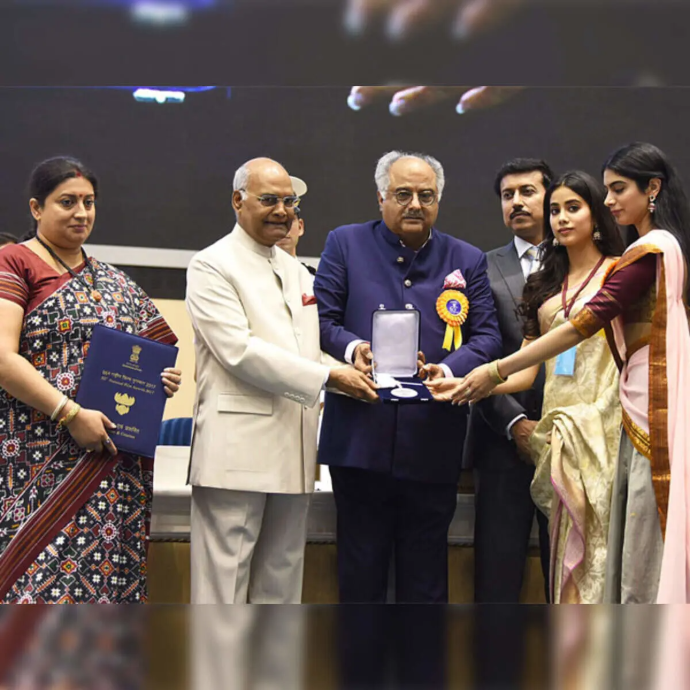
Zubeen's talent as a music director received prestigious recognition when he won the National Film Award for Best Music Direction for the non-feature film "Echoes of Silence" at the 55th National Film Awards in 2009. He also received a nomination for Best Music Direction for the film "Dinabandhu" at the 52nd National Film Awards, demonstrating his consistent excellence in film music composition.
Zubeen Garg receiving a prestigious award at the National Film Awards ceremony, highlighting his accomplishments in Indian music and cinema economictimes
Awards and Honors
Throughout his career, Zubeen accumulated numerous awards and recognitions that testified to his multifaceted talents. Beyond the National Film Award and Global Indian Film Award, he won multiple Prag Cine Awards for Best Actor, Best Film, and Best Music Direction for "Mission China" in 2017. His poetry also received recognition when his poetry book won the Seuji-Seuji Award in 2017.
The University of Science and Technology, Meghalaya, conferred an honorary Doctor of Literature (D.Litt.) degree on Zubeen in May 2024, acknowledging his immense contribution to literature and arts. In 2011, he was honored as Guest Artist of the Year at the Assam Convention held in Oakbrook, Chicago, representing Assamese culture on an international platform.
Musical Versatility and Linguistic Mastery
Multilingual Genius
One of Zubeen's most remarkable achievements was his ability to sing in over 40 languages and dialects, making him one of India's most linguistically versatile performers. His repertoire included major Indian languages such as Hindi, Bengali, Tamil, Telugu, Malayalam, Marathi, Odia, Kannada, Punjabi, and Nepali, as well as numerous tribal languages of Northeast India including Bishnupriya Manipuri, Adi, Boro, Goalpariya, Karbi, Mising, Tiwa, and Khasi.
This linguistic versatility allowed him to serve as a cultural bridge between different communities, using music as a universal language that transcended regional and ethnic boundaries. He recorded over 32,000 songs throughout his career, an extraordinary achievement that speaks to both his prolific output and enduring popularity.
Instrumental Mastery
Zubeen's technical musical abilities extended far beyond singing to encompass mastery of twelve different instruments. His proficiency with traditional instruments like the dhol, dotara, tabla, and harmonium enabled him to maintain authentic connections to folk traditions, while his skills with modern instruments like guitar, keyboard, and drums allowed him to create contemporary arrangements.
This instrumental versatility was crucial to his ability to blend traditional Assamese sounds with modern musical styles, creating the distinctive fusion that became his signature. His multi-instrumental abilities also made him largely self-sufficient in music production, giving him complete creative control over his artistic output.
Cultural Activism and Social Consciousness
Defying ULFA's Cultural Diktats
One of the most defining aspects of Zubeen's public persona was his fearless stance against militant organizations' attempts to dictate cultural practices. The United Liberation Front of Asom (ULFA) repeatedly issued warnings against singing Hindi songs during Bihu festivals, claiming they represented cultural invasion. Zubeen consistently defied these diktats, arguing that artists should have the freedom to express themselves without militant interference.
His defiance came at considerable personal risk, as ULFA threatened him with violence for refusing to comply with their cultural restrictions. However, Zubeen's response was characteristically bold: "Who the hell are you? I don't care... They told me, 'You can't sing Hindi or Bengali songs.' I replied, 'Who the hell are you? I don't care.' Then they threatened to shoot me. I said, 'Okay, you shoot me, and I'll shoot you'". The Assam government provided him with security coverage, including personal security officers and escort vehicles.
Anti-CAA Movement Leadership
Zubeen emerged as one of the most prominent non-political voices in Assam's resistance to the Citizenship Amendment Act (CAA). From 2017, when the CAA was still a bill, he vehemently opposed the legislation, declaring it a threat to Assam's cultural essence. His opposition was not merely symbolic; he actively participated in protests and used his influence to mobilize public opinion against the act.
During the height of the anti-CAA protests in 2019-2020, Zubeen led the Silpi Samaj (artists' community) in rallies alongside organizations like AASU (All Assam Students' Union) and AJYCP (Asom Jatiyatabadi Yuba Chatra Parishad). He launched the website "assamagainstcaa.in" to amplify voices against the legislation and prevent communal division. His powerful statements during this period, including "I will die but won't allow Citizenship Amendment Act in Assam" and "As long as I am alive, CAA will not be implemented," became rallying cries for the movement.nenow
Even as late as 2024, Zubeen reaffirmed his opposition to the CAA, stating, "I opposed the CAA and will continue to oppose it until it is repealed," promising ongoing protests "in my own ways" through stages and social media. His stance emphasized peaceful resistance while maintaining that Assam would never accept the legislation.
Philanthropy and Social Service
Kalaguru Artiste Foundation
Zubeen's commitment to social causes found institutional expression through the Kalaguru Artiste Foundation, his charitable trust that provided financial support to various social causes. The foundation was particularly active during natural disasters, especially the recurring floods that affected Assam. Zubeen regularly appealed to the public for donations of clothes, medicines, and monetary aid for flood victims.
His philanthropic approach was hands-on and personal, often using his celebrity status to raise awareness and funds for those in need. He organized charity football matches to raise funds for flood-affected communities, combining his love for sports with his commitment to social service. During the COVID-19 pandemic, Zubeen offered his two-storey residence in Guwahati to be used as a COVID Care Centre, addressing the urgent shortage of beds during the health crisis.
Environmental and Social Advocacy
Beyond disaster relief, Zubeen's philanthropic efforts extended to environmental conservation and supporting underprivileged communities. He was involved in AIDS awareness campaigns, brain cancer research, and mental health initiatives, often performing benefit shows where his music raised both funds and spirits. His approach to charity was characterized by direct engagement rather than distant donations, reflecting his belief in personal responsibility toward society.
Through his films, particularly "Kanchanjangha," he raised awareness about corruption in government recruitment processes, using entertainment as a vehicle for social commentary. His irreligious stance and declaration of no caste or creed made his charitable work inclusive, appealing to Assam's diverse population regardless of religious or ethnic affiliation.
Folk Music Preservation and Cultural Bridge-Building
Championing Traditional Assamese Music
While Zubeen gained national fame through contemporary and fusion music, he remained deeply committed to preserving and popularizing traditional Assamese folk forms. He was instrumental in popularizing Bihu songs, Tukari geet (a type of folk song), Kamurpi Lokageet, Goalporia Lokageet, and many other traditional forms. His deep admiration for folk music was evident in his perfect renditions of Bihu songs that kept younger generations connected to their cultural traditions.
Zubeen's approach to folk music was not merely preservational but transformational, as he found ways to present traditional forms in contemporary arrangements that appealed to modern audiences. His ability to sing in all languages and dialects of Northeast India made him a unique cultural ambassador for the region's diverse musical traditions.
Bridging Generational and Cultural Gaps
One of Zubeen's most significant cultural contributions was his ability to serve as a bridge between different generations of Assamese people. While appealing to youth through his modern arrangements and contemporary sensibilities, he also earned the admiration of older generations who appreciated his respect for traditional forms and his technical mastery.
His music created an inclusive cultural space where traditional and modern elements coexisted harmoniously, helping to prevent the cultural alienation that often accompanies rapid modernization. This bridge-building extended beyond music to his public persona, where he demonstrated that one could be globally aware while remaining culturally rooted.
Personal Life and Relationships
Marriage and Family
In 2002, Zubeen married Garima Saikia Garg, a fashion designer who became not only his life partner but also a crucial collaborator in his artistic ventures. Garima played a supportive role in Zubeen's artistic projects and was often credited as producer and costume designer in his films. Their partnership represented a successful blend of personal and professional collaboration, with Garima contributing significantly to the visual aspects of Zubeen's creative projects.
Family Tragedy and Artistic Response
Zubeen's personal life was marked by a profound tragedy in 2002 when his younger sister Jonkey Borthakur, an actress and singer, died in a car accident near Tezpur while traveling to a stage performance with co-artists. This loss deeply affected Zubeen, who channeled his grief into creating the album "Xixu" in memory of his late sister. The album served as both a tribute to Jonkey and a demonstration of how Zubeen processed personal pain through artistic expression.
His other sister, Dr. Palme Borthakur, pursued a different path as a physician, representing the family's diverse talents and achievements. The Borthakur family's artistic legacy continued through Zubeen's work, which often referenced his family's influence on his creative development.
Legacy and Cultural Impact
Influence on Modern Assamese Identity
Zubeen's impact on Assamese culture extended far beyond entertainment to influence how an entire generation understood their cultural identity. His music provided a template for being simultaneously modern and traditional, global and local, helping young Assamese people navigate the complexities of identity in a globalized world. His fearless advocacy for cultural freedom and social justice made him a role model for engaged citizenship.
The phrase "Zubeen da" became synonymous with cultural pride and authenticity in Assam, representing not just a beloved entertainer but a cultural icon who embodied the aspirations and values of his community. His ability to mobilize public opinion on social and political issues demonstrated the power of cultural figures to influence societal discourse.
Impact on Assamese Cinema Industry
Zubeen's contributions to Assamese cinema helped revitalize an industry that was struggling to compete with big-budget Bollywood productions. His films, particularly "Mission China" and "Kanchanjangha," set new commercial benchmarks for Assamese cinema while addressing socially relevant themes. His success demonstrated that regional cinema could achieve both commercial viability and artistic integrity.
His approach to filmmaking, which combined entertainment with social commentary, influenced a new generation of Assamese filmmakers who sought to create meaningful cinema that reflected local concerns while appealing to broader audiences. The technical excellence and production values of his films raised standards for Assamese cinema industry as a whole.
Final Years and Lasting Message
Continued Relevance and Evolution
Even in his final years, Zubeen continued to evolve as an artist and social commentator, adapting his message and methods to contemporary circumstances while maintaining his core values. His appointment as Cultural Brand Ambassador for the North East India Festival in Singapore in 2025 demonstrated his continued relevance as a representative of Northeast Indian culture.
His last interviews revealed a man who remained committed to his ideals while reflecting on his journey with characteristic introspection and humor. His expressed wish to spend his final days at Tilla (the Mahabahu Brahmaputra River Heritage Centre) and to be "washed up in the Brahmaputra" reflected his deep spiritual connection to Assam's landscape and culture.
The End of an Era
Zubeen's sudden death on September 19, 2025, while participating in a recreational scuba diving activity in Singapore, shocked fans across India and beyond. The tragedy occurred while he was serving as Cultural Brand Ambassador for the North East India Festival, highlighting his commitment to promoting regional culture even in his final days.
The immediate response to his death – including three days of state mourning declared by the Assam government and tributes from Prime Minister Narendra Modi, Chief Minister Himanta Biswa Sarma, and numerous other political and cultural figures – demonstrated the profound impact he had on Indian society. The cancellation of the North East Festival following his death symbolized the irreplaceable void his passing created.
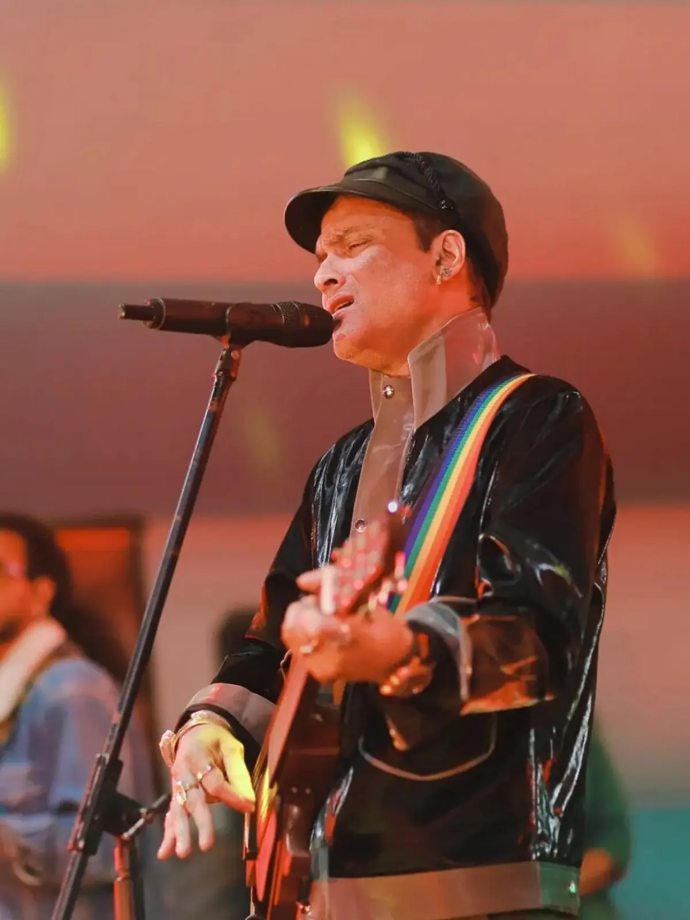
Zubeen Garg performing live with guitar and rainbow-colored strap at a cultural event wikipedia
Conclusion: The Immortal Voice Lives On
Zubeen Garg's life and career represent more than just individual artistic achievement; they embody the cultural journey of Assam itself through the late 20th and early 21st centuries. From his revolutionary debut with "Anamika" in 1992 to his tragic death in 2025, he served as both chronicler and catalyst of Assamese cultural evolution.
His legacy encompasses multiple dimensions: the musical innovator who fused traditional and contemporary elements, the fearless activist who stood up to militant groups and discriminatory legislation, the philanthropist who used his fame to serve society's most vulnerable members, and the cultural ambassador who represented Northeast India's rich heritage to the world. His 32,000+ songs in 40+ languages constitute an unprecedented cultural archive that will continue to inspire future generations.
Perhaps most importantly, Zubeen Garg demonstrated that artistic excellence and social responsibility are not mutually exclusive but can reinforce each other to create lasting cultural impact. His voice may have fallen silent, but the values he championed – cultural pride, social justice, artistic freedom, and human compassion – continue to resonate through the countless lives he touched and the institutions he influenced.
The title "Heartthrob of Assam" captures only one facet of his multidimensional legacy. Zubeen Garg was ultimately the voice of a people, the conscience of a generation, and the bridge between tradition and modernity that helped define what it means to be Assamese in the contemporary world. His immortal voice will continue to echo through the hills and valleys of Assam, inspiring future generations to embrace their heritage while fearlessly pursuing their dreams.